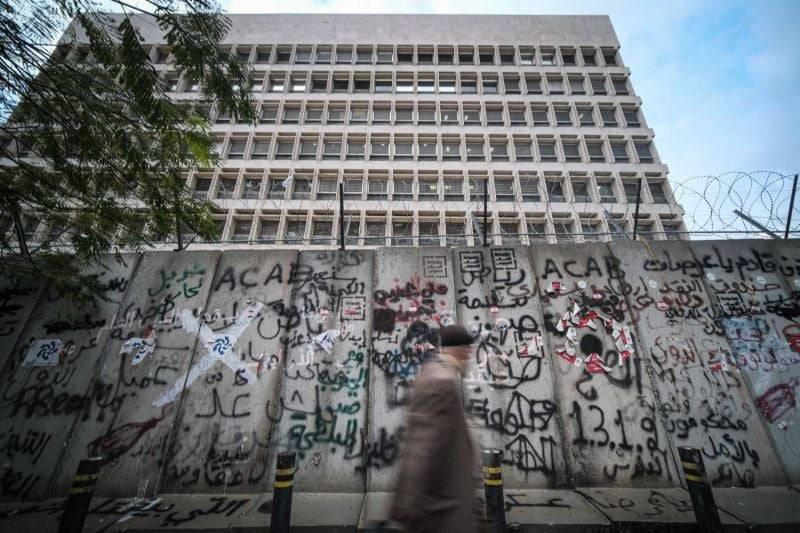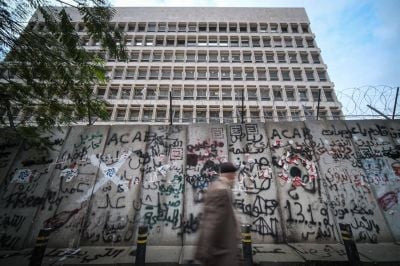
The facade of the Banque du Liban in Beirut. ( Credit: João Sousa)
Determined to prevent the government from implementing informal capital controls, the Beirut Bar Association ultimately decided not to challenge Banque du Liban (BDL)’s Circular 165 before the State Council.
This comes after the central bank took action by lodging an appeal with the State Council against cabinet decision no. 22 of April 18.
Published on April 19, the decision seemed to differentiate between funds held in dollars and lira that have been subject to informal banking restrictions since the onset of the crisis in 2019, and the “new” funds that remain unaffected and can be freely utilized.
In a letter dated May 24, which was viewed by L’Orient-Le Jour, the central bank explicitly clarified that Circular 165 is not designed to validate the differentiation between old and new deposits. It emphasized that all provisions of the circular are intended to align with international standards in combating money laundering and the financing of terrorism.
The Beirut Bar Association is expected to issue a statement soon.
Explanations in two parts
The letter is signed by BDL Governor Riad Salameh, who is currently facing significant legal and media scrutiny concerning a separate issue related to his personal assets.
The letter was sent in response to an initial message from the Bar Association on May 10. It comprised two primary sections that addressed the concerns raised by the Bar.
The first part of the memo explicitly clarified BDL’s position by stating that it does not differentiate between old and “new funds,” stressing that this term which was used in Circular No. 165 is solely employed to describe the specific and limited systems established within the circular itself.
In other words, the letter explains that Circular No. 165 introduced separate procedures for payment and clearing systems in “fresh” dollars and Lebanese lira, distinct from the previous ones in place.
The central bank affirmed that its “exceptional measures,” introduced since the start of the crisis, including Circular No. 151, were never intended to legitimize the distinction between deposits — a decision that falls under the jurisdiction of Parliament.
The Code of Money and Credit grants the central bank temporary powers to restrict capital circulation, in case it is necessary to safeguard the integrity of the Lebanese financial system. However, the responsibility of making such measures permanent through legislation lies with the Parliament.
A request from FATF
In the second part of its letter, BDL clarified that Circular 165 aims to promote “financial inclusion” by reintroducing cheque and bank card payments in an economy that has become heavily reliant on cash. This shift is a response to the loss of depositors’ trust in banks, which have been imposing unauthorized and arbitrary restrictions on funds for over three years.
BDL further stated that Circular No. 165 was implemented in response to a request from the Financial Action Task Force (FATF), the international organization responsible for coordinating global efforts against money laundering and terrorism financing.
FATF emphasized the need for Lebanon to adhere to its own legislation in this domain, specifically referencing Law No. 44 dated Nov. 24, 2015, which provides for the range of control measures that financial institutions must establish. FATF considered the mechanism outlined in Circular No. 165 as necessary to fulfill these requirements.
Recently, Lebanon has been placed on the FATF’s gray list of countries under surveillance, based on an evaluation conducted by the organization’s regional office for the MENA region. This designation places Lebanon under heightened monitoring and requires that the country take necessary actions to improve its compliance and prevent further deterioration.
Currently, only three countries — namely Burma, North Korea and Iran — are on the FATF blacklist.
Sufficient guarantee?
The Bar Association considered the assurances provided by BDL to be satisfactory. Taking into account its role as a stakeholder in combating money laundering and terrorism financing, as outlined in Article 5 of Law 44/2015, the Bar decided on Wednesday not to pursue the annulment or suspension of Circular No. 165 through the State Council. This decision was made in order to avoid further deterioration of Lebanon’s FATF rating and to prevent the disruption of the country’s remaining banking exchange system with the international community.
However, during the same week, the Bar Association proceeded to file the previously prepared appeal for annulment based on ultra vires grounds. This appeal was directed against a decision made by the cabinet on April 18, which was one day before the publication of Circular No. 165. The decision issued by the caretaker government requested BDL to mandate banks to establish consistent limits on withdrawals and transfers, as well as to establish official segregation between deposits subjected to restrictions and unaffected deposits.
The publication of the decree and circular without much public attention raised legitimate public concern. Some perceived this as an attempt by the government and the central bank to legitimize banking restrictions without considering the rights of depositors. There was also a concern that the newly injected dollars into the banking sector could indirectly be used to bail it out, exacerbating the situation further.
“The Bar, with valid reasons, believed that the timing and certain provisions of Circular No. 165 raised legitimate concerns regarding depositors’ rights,” stated a member of the Association Bar Committee for the Defense of Depositors’ Rights, who supported the President of the Bar throughout the process. “Following a series of [letter] exchanges, BDL eventually agreed to provide written assurances,” the member told L’Orient-Le Jour on condition of anonymity, due to the sensitive nature of the issue..
Questions for the banks
Without having the same value as a regulatory text, the letter could possibly serve to clarify the ambiguity surrounding the question of old and new deposits and as a result, serve as an element of presumption to help a depositor assert his rights before the courts, the legal expert explained.
BDL’s demonstrated a spirit of openness and dialogue exemplified by Wassim Mansouri, the first senior vice-governor and the bar association’s contact for deposit and rights issues. While this may provide reassurance to the Bar Association, there is still criticism from within the banking sector regarding the entire mechanism established by Circular No. 165.
In a tweet, Jean Riachi, CEO of I&C Bank, clarified that the text of Circular No. 165 permits banks to deposit their customers’ newly acquired dollars with BDL. Once deposited, these dollars are converted into bank dollars that can only be transferred within Lebanese banks.
The funds are able to be withdrawn in cash, but not transferred abroad, Riachi added, arguing that this would eventually erode the value of dollars circulating in Lebanon.
“That’s what we’ve understood for the time being. Dollars deposited at BDL are theoretically transferable abroad since they can be withdrawn in cash, but this may prove more complicated, especially for large amounts,” Riachi told L’Orient-Le Jour.
This article was originally published in French in L'Orient-le Jour. Translation by Sahar Ghoussoub.
